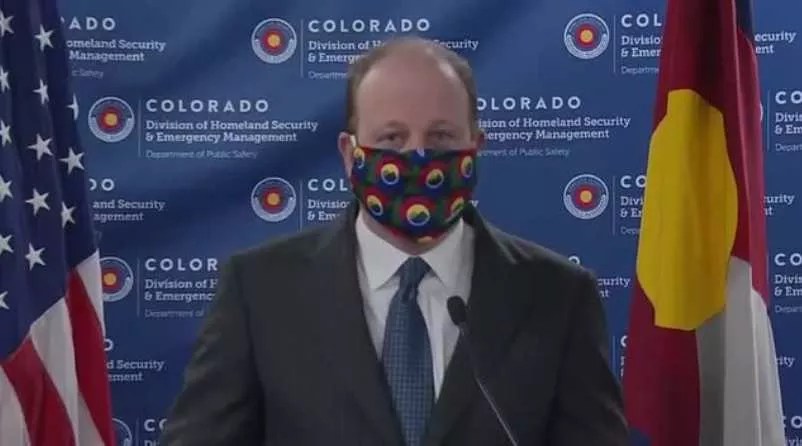
coiorado.gov

Audio By Carbonatix
During an April 3 press conference at the Emergency Operations Center in Centennial to update the public on the fight against COVID-19, Colorado Governor Jared Polis called on everyone in the state to wear a cloth face mask whenever they go out in public, whether they’re inside a grocery store or strolling the streets.
Moreover, Polis encouraged folks to use creativity in making their own masks, which he stressed could be done by those without any sewing skills using items already in their possession, such as old clothing and scissors. After saying he wanted to establish wearing cloth masks as a new part of Colorado culture, he noted, “It’s human nature to go along with a trend. As more people start to wear masks, others will follow. So let’s make it cool.”
Assisting Polis in delivering this message was Denver-based singer-songwriter Nathaniel Rateliff, who appeared by video (despite some minor technical difficulties) in a public-service announcement promoting masks for both their safety and fashion sense.
These lighthearted moments came in the wake of a somber introduction to the talk, with Polis expressing condolences to all of those who’ve died of COVID-19 to date, including El Paso County Deputy Sheriff Jeff Hopkins; he lost his life at the age of just 41.
He then noted that he would focus the remainder of his remarks in three areas: relief for businesses and workers, testing capacity and containment efforts, and new tactics “to stop the spread and make life easier.”
In an aside, Polis said, “I want to share how frustrated we all are,” adding that “we know the better job we do staying at home, the sooner we can return to normal economic activity.”
On fiscal subjects, Polis touted federal programs that will provide $1,200 to most Americans making $75,000 per year or less, $500 in child credits for all, with no income limit, and aid to small businesses that agree not to lay off workers.
Closer to home, Polis touted the decision to waive penalties and interest for people who owe taxes up until July 15, an extension from the usual April 15 deadline. Also offered is a one-time, thirty-day extension for businesses to file and remit their state sales tax – a deal that encompasses local taxes in 272 jurisdictions. Likewise, Polis announced that he had expanded the time period during which counties can waive interest payments for property taxes from April 20 to the end of the month. Property tax payments can be split so that those who submit half the amount in April and the other half in June will not be penalized; county treasurers will have the details.
The problems that have afflicted Colorado’s unemployment website are mostly in the past, Polis maintained, but he still recommended that individuals having difficulty gaining access should try to do so at lower-use times, such as late evenings or early mornings.
In a change of topic, Polis offered a mid-day update on the impact of the novel coronavirus on the state: 4,174 cases, 806 hospitalizations, more than 22,000 people tested and 105 deaths. This was the first time Colorado’s death count exceeded 100 – but it’s a measure of how quickly the infection is moving that Polis did not remark on this tragic benchmark.
Progress has been made in scaling up testing capacity. The state is now conducting more than 2,000 tests per day and has the capacity to multiply that total by five, to 10,000 daily – but Polis said that’s not possible at present owing to shortages of testing supplies, Nonetheless, he’d like the state to reach the 3,500-tests-per-day threshold in the next two weeks, and 5,000 per day by May 1. He also reiterated that those who have mild symptoms should not leave their homes and risk spreading the virus to others in order to be tested; instead, they should self-isolate until the condition has run its course.
At that point, Polis revealed “the big change: We’re asking all Coloradans to wear face coverings when they go out of their house for any of their essential functions,” and modeled a mask of his own. After wearing the items, he said, the masks should be run through the washing machine and people should wash their hands for at least twenty seconds and do the same for their face.
The donning of face masks has long been common in Asia, Polis pointed out, and he credited this habit with helping to flatten the curve of cases in places such as South Korea. To make such activities more appealing to Coloradans, he urged residents to make masks out of old T-shirts that they might have lying around – like ones commemorating the “1998 Guacamole Champion,” he suggested. He planned to do likewise and promised to share results on social media. Complete instructions are available on the Colorado Mask Project website, at coloradomaskproject.com.
Such items are not as effective as the N95 masks that are being sought for health-care workers and the like, Polis conceded, but they can definitely help. “The spread of the virus is mostly through droplets in the air, which fabrics can filter,” he noted. Moreover, the 25 to 50 percent of people who may be asymptomatic won’t be nearly as likely to spread a virus they don’t even know they have if their face is covered with a cloth mask.
Next, Polis introduced Sarah Tuneberg, a member of the state’s innovation team, who screened the Rateliff clip. She said that the goal is to produce 100,000 masks per week.
Upon his return to the podium, Polis stated that “these types of actions are really bringing us together as a state, a country and a world – because we can’t wait until life gets back to closer to normal.” The masks “are not just cool,” he noted. “They’re literally allowing all of us to return to work sooner and save lives as we build the medical capacity we need.”